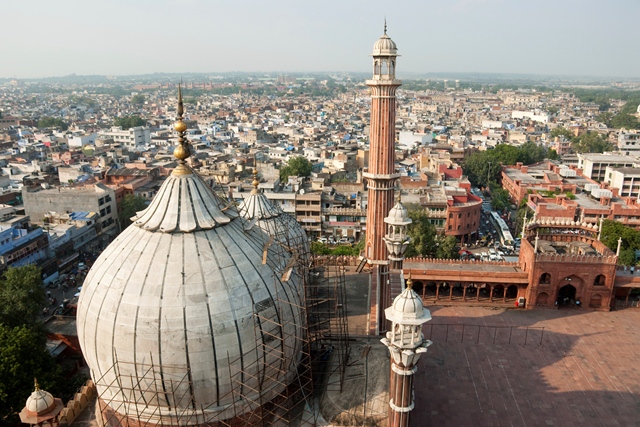Dilli O' Dilli

If Bombay is an independent, entrepreneurial go-getter, Delhi is her older, seemingly complicated aunt. While the former is constantly trying to prove herself, the latter has long since demonstrated her value but has come to not be able to recognize it. Delhi is poised and cultured, and crude and pot-bellied, all at once; she is humble and worthy inherently, but ravenous and ostentatious when insecure; she is affable and altruistic on her better days, and stuck-up when she thinks that is what is expected of her.
Delhi’s paradoxical character is the result of her long, tumultuous experiences. She has opened her door and extended a welcoming hand to the diverse peoples that she has encountered; the result of which has led her to imbibe a uniquely syncretic ethos. No other Indian relative of hers is as comprehensively secular as her, having become a home to myriad cultures and languages, where individuality is respected and rarely targeted.
The visitor and the Dilliwallah alike need to understand the city’s complicated trajectory to be able to appreciate New Delhi as she is today. They need to resist first impressions and quick judgments. The city has no one face, no singular identity. She switches character effortlessly, and her audience will be easily convinced that their perception of her is her truest representation. What makes Delhi herself is that she has no singular real representation; she is what you make of her and what you want her to be. She has been shaped to be so by 3000 years of history – of welcoming people and not asking questions pertaining to their interests or their beliefs.
Today, if you choose to grace the city’s many page-3 parties and swank hotel bars, you will label her as spoilt, affected and extravagant. If you mingle with her political avatar, you will see her as undeserving, guileful and even perhaps iniquitous. If you work with her on aspects of civil society, you will perceive her as motivated, passionate and conscientious. You would be foolish to define her based on your limited experience, whether you are a passerby or a resident. The only way to understand Delhi is by allowing yourself to be surprised, and to refrain from stereotyping or judging her.
In my twenty-five years of being a proud Delhi-girl, I have interacted with some of her best and worst features. Delhi has taught me to value perspectives and to realize that there is no such thing as uniformity. Growing up fairly privileged in a city that receives the largest influx of migrants in India, you are exposed to struggles and tribulations on a daily basis. Seeing a little girl from a poor village begging at a traffic light or hearing about an elderly man who cannot afford a 10-rupee bus ticket to a hospital to receive regular medication for his life-threatening illness, makes you question policies and re-evaluate your understanding of equality and justice. You realize you are not insulated, and that there is a deep unfairness in advocating measures that benefit the privileged few of this country. You also realize the importance of collective prosperity in determining progress and growth. The tragedy is that too many people in Delhi are oblivious to her many faces, and the privileged few choose to see her as lavish and thriving, turning their face away from the little girl at the traffic light and continuing on their way to one of the city’s posh shopping malls.
It is therefore, no surprise that Aunt Delhi has grown to become so inconsistent and confused. She’s a gentle character, acquiescent and not forceful. She cannot push you to recognize her contribution and value, for it has been over the years, self-explanatory. She is, as I have said before, what you make of her; she will not force any facet of her identity upon you. It is from this understanding of Delhi that I urge you to experience her many faces – take a bike ride in the narrow gallis of the walled city and revel in the variety of sights, sounds and smells; spend leisurely hours at the many lesser-known monuments; attend a Sufi-recital and a rock-concert; order a cocktail at a fancy hotel bar; indulge in street-shopping and bargain with no hesitation; play with the little children at a basti. Most importantly, speak to everyone – hear stories, ask about ideas and aspirations, enrich yourself with perspectives. Just never judge and you will come to love Delhi the way she deserves to be loved.



